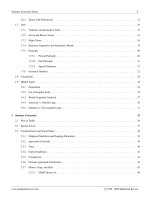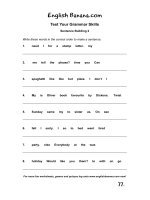Sentence agreement 2
Bạn đang xem bản rút gọn của tài liệu. Xem và tải ngay bản đầy đủ của tài liệu tại đây (10.13 KB, 1 trang )
Sentence Agreement
The verb must agree with the subject in number and person, i.e., it must be of the same number (singular / plural)
and person as the subject.
He likes singing.
They like singing.
Here the subjects he and they are in the same person – third – but the first is singular and the second is plural in
number. The verb like has two forms in the third person – likes and like. The form likes is used with singular
nouns, while the form like is used with plural nouns.
Thus we find that the verb must agree with its subject in number and person. That is it must be of the same
number and person as its subject.
Notes
Nouns usually have -s ending in the plural. Verbs have no -s ending in the plural.
The bird flies. / The birds fly.
The boy sings. / The boys sing.
The star shines. / The stars shine.
You will have noticed that only the third person singular has different endings. The verb remains unchanged in all
other forms.
The verb be (is, am, are, was and were) has different forms in the singular, but not in the plural.
First person singular: I am / I was
First person plural: We are / we were
Second person singular: You are / you were
Second person plural: You are / you were
Third person singular: He is / she is / it is / he was / she was / it was
Third person plural: They are / they were
Stay on top of your writing! Download our grammar guide from www.englishgrammar.org to stay up-to-date.
Powered by TCPDF (www.tcpdf.org)









